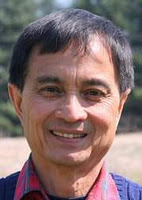Ahead?
I was encouraged to see political pragmatism emerge as ruling and opposition leaders dealt with the seat fight and the Assembly’s rejection of CNRP nominees. I don’t expect the Premier to abandon his MachivellianAsian Sam Kokmaneuvers against the CNRP. But I trust the Premier’s desire and ability to do what is right to leave a legacy for the younger generation. He is not blind to the overwhelming numbers of people, even in his own party, who want change. I hope members of the CNRP also will continue to be measured in their discourse and focused on their goals.
Neither party should be swayed byinflexible and intransigent notables and supporters who are blinded by “we-they” perspectives and obsessed with denial and blame.Read about them in Charet Khmer (Khmer personality traits), by the late Boun Chan Mol, but don’t let them thwart the progress that is on our doorstep.
For a better Cambodia, Khmer democrats need to recallBuddha’s teaching and guiding principles: Do good, avoid evil, purify the mind. CNRP lawmakers must devote tireless efforts to seek reforms and report back to the people and to international observers. The people will hold those who thwart progress accountable at the polls. No government can last without the support of the governed.
 Events have made clear that neither Prime Minister Hun Sen and his ruling Cambodian People’s Party, despite their control over state institutions and the national wealth, nor Mr. Sam Rainsy and his opposition Cambodian National Rescue Party, despite increasing popular support, has sufficient leverage to finesse the other.
Events have made clear that neither Prime Minister Hun Sen and his ruling Cambodian People’s Party, despite their control over state institutions and the national wealth, nor Mr. Sam Rainsy and his opposition Cambodian National Rescue Party, despite increasing popular support, has sufficient leverage to finesse the other.
My last article in this space, “A compromise based on the high national interests and the people,” dealt with the July 22 Agreement, signed by leaders of both parties, proclaiming”an end” to a year-long political deadlock. The Premier sought to “legitimize” his government by bringing to the National Assembly the 55 boycotting members elected from the CNRP. Mr. Sam Rainsy concluded that he and his party had more to gain by bringing their opposition to the Assembly floor. The Agreement provides Cambodia and her people with a reprieve from chaos and an opportunity to focus on economic development issues.
But, “It ain’t over till it’s over.” The road to implementing the Agreement is long and obstacles are many, starting with Charet Khmer, including the Khmer cultural propensity of A’thmarAnh, of favoring one’s own well-being to the detriment of collaboration. “National reconciliation and national unity” require a spirit of compromise and the deferral of one’s immediate interests, concepts not embedded in the Khmer ethos. Khmer leaders face this hurdle among many others on the road to progressive change.
I remain mystified that is has taken a year of deadlock, of lives lost and of diminished national economic productivity to conclude on the one hand that the opposition cannot be eliminated and on the other that mass street protests are insufficient to force the Premier’s resignation; that no signatory government of the 1991 Paris Peace Agreement will initiate the proper implementation of the Accords; that until CNRP leaders present themselves as a credible alternative, world community members are likely to deal with “the devil” they know…
Right words, good intents
On August 8, the 55 CNRP lawmakers-elect took their seats in the National Assembly despite endless pronouncements that they “would never” do so without the guarantee of a new election. As such, CNRP leaders have accepted to become a part of a (CPP) government they had branded as illegitimate. CNRP lawmakers – who collectivelyreceived votes from at least half of the electorate – now have a moral responsibility to right what they see as contributing to that illegitimacy. They have to work with the 68 CPP lawmakers to reform theNational Election Committee,amend the National Assembly’s internal regulations, and the Constitution.
In welcoming the 55 CNRP lawmakers, Premier Hun Sen urged “all MPs to increase the culture of dialogues in order to work together to serve the nation.” CNRP leader Sam Rainsy replied, “This is the opening of a new historic chapter in Cambodia. We will work together to defend territorial integrity and to build prosperity for the nation,” and declared, “We should not work against each other as enemies but as partners who have come together in good faith to find long lasting solutions for a just, fair and sustainable development. Let us leave behind the dark pages of the past.”
